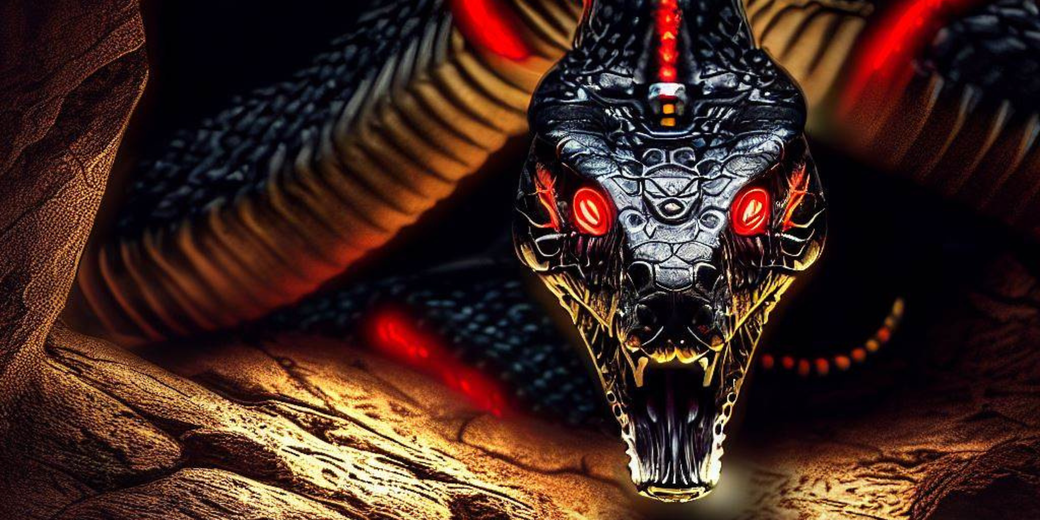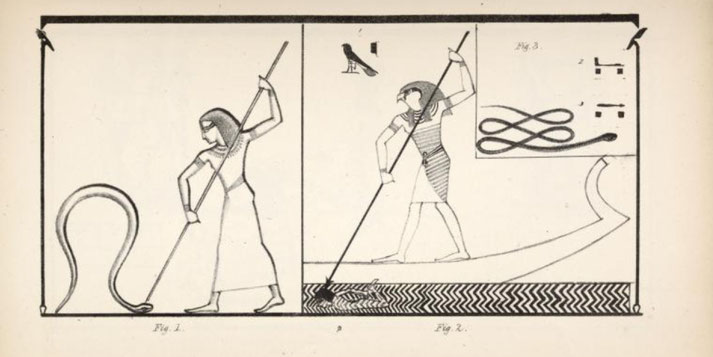Apophis: every ancient Egyptian's greatest fear after death

In ancient Egypt, there was a mythical creature that struck fear into the hearts of all who knew of it. Its name was Apophis, and it was believed to be a monstrous serpent that threatened the very balance of the universe.
From the earliest days of Egyptian mythology to the height of Egyptian civilisation, Apophis was a figure of terror and awe, whose power was said to be so great that even the gods themselves were forced to band together to keep it at bay.
But what was Apophis and why were the Egyptians so terrified of it?
What was Apophis?
In ancient Egyptian mythology, Apophis, also known as Apep, was a malevolent deity or demon, often depicted as a giant serpent or snake.
He was considered to be the embodiment of chaos, of destruction, and deep darkness.
Ultimately, Apophis was believed to be the primary enemy of the gods and the pharaoh.
Apophis wanted to overthrow the order of the universe and plunge the world into eternal darkness by devouring the sun god Ra.
Ra was considered to be one of the most powerful deities in ancient Egypt and his regular battles with Apophis were seen as essential to preserving Ma'at, the balance of the universe.
Because of his destructive goals, Apophis was an important figure in Egyptian religious beliefs and rituals.
How do we know about Apophis?
The mysterious figure of Apophis appears in a variety of ancient Egyptian texts.
The oldest known references to Apophis appear in the Pyramid Tests from the Old Kingdom period (c. 2400 BCE). Here he is introduced as a serpent threatening Ra's solar barque, or sun boat, during its journey across the sky and through the underworld.
Apophis is also mentioned in several spells of the Coffin Texts, which were a collection of funerary spells that were inscribed on the coffins of the elite during the Middle Kingdom period (c. 2055-1650 BCE).
He also features in the Book of the Dead. This was another a collection of funerary spells and instructions, but dates from the much later New Kingdom period (c. 1550-1069 BCE).
In the Book of the Dead, Apophis is portrayed as a powerful enemy of the deceased.
He must be defeated during the person's journey to the afterlife in order for the soul to pass safely into the Field of Reeds.
Why was he so feared?
According to Egyptian beliefs, after death, the soul of the deceased would embark on a perilous journey through the underworld.
On the way, they had to face a series of trials and obstacles, with one of the most significant obstacles being Apophis himself.
In many of the accounts, he would lie in wait for the soul in the underworld, ready to attack and devour it.
Frequently Apophis was really lying in wait for Ra. It was thought that if Apophis were to succeed in defeating Ra, it would bring about the destruction of the entire cosmos and unending darkness.
Apophis was said to be difficult to defeat, which only added to the fear and respect he commanded.
How could Apophis be defeated?
To protect the soul from Apophis, the ancient Egyptians developed a variety of funerary spells and rituals.
For example, in the Book of the Dead, there are several spells that instruct the deceased on how to identify and defeat Apophis and how to protect oneself from his malevolent influence.
These spells often involve the use of protective amulets, incantations, and symbolic gestures.
The great battle in the Book of Gates
In the Book of Gates, the gods are depicted as assisting Ra in his repeated battles against Apophis and thereby protecting the universe from the forces of darkness.
The text describes the gods as forming a protective barrier around Ra's boat, which shields him from Apophis' attacks.
The gods then use their magical powers to defeat Apophis, firing magical arrows at the serpent and using spells to banish him from the realm of the gods.
The Book of Gates also describes the role of the deceased in this battle. According to the text, the deceased is seen as an ally of the gods, and is depicted as helping to defend Ra's boat from Apophis' attacks.
Ultimately, the text suggests that the deceased can earn their place among the gods by assisting in the defeat of Apophis and helping to maintain the balance of the universe.
The defeat of Apophis in the Book of Gates represents the triumph of order over chaos, and is just one example of the many rituals and beliefs that the ancient Egyptians used to protect themselves from the malevolent forces that threatened their world.

What do you need help with?
Download ready-to-use digital learning resources
Copyright © History Skills 2014-2025.
Contact via email
With the exception of links to external sites, some historical sources and extracts from specific publications, all content on this website is copyrighted by History Skills. This content may not be copied, republished or redistributed without written permission from the website creator. Please use the Contact page to obtain relevant permission.





